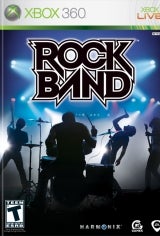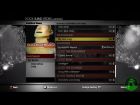As it turns out, the drums offer the most challenge in Rock Band, as the addition of the kick pedal adds an entire new level of complexity to the game. It doesn't take long to get the hang of playing simple rhythms, but by the time you're working your way through the Hard difficulty, you'll feel besieged by constant rolls that make it hard to keep a streak going, and the Expert versions of the song are loaded with never-ending kick drum beats that may often seem too rapid to be played by normal humans.
The vocals are a bit easier, but require some prior knowledge of songs: unlike the other instruments, where it's abundantly clear what a yellow note requires you to do, the vocal tracks only show relative pitch, so you'll need to get familiar with the songs to learn exactly what you're supposed to be singing.
Rock Band's setlist is a fairly impressive one. There's a wide array of genres and eras represented, from The Who's "Won't Get Fooled Again" and Blue Oyster Cult's "(Don't Fear) The Reaper" to modern hits like Jet's "Are You Gonna Be My Girl" and Queens of the Stone Age's "Go With The Flow." The best thing is that almost all the songs are original tracks, putting an end to the sub-par cover versions that sometimes plagued the Guitar Hero titles.
Once you've got four players together, you can get into the meat of Rock Band: playing as a group. The interface is fairly clean, with three columns showing the guitar, drum and bass tracks, and the vocals running horizontally across the top.
A number of special features make band play more than just co-op with four people. As players collect energy and deploy Overdrive -- Rock Band's version of Star Power -- the entire band benefits from a bonus multiplier. If the entire band uses Overdrive at the same time, you can build a x8 score multiplier for the group, which, combined with a max of x4 for guitar, drums and vocals and x6 on bass (yes, the bass goes to x6 now), means you can build x32 or x48 bonus multipliers, making it possible to put up scores of 2 million and higher on a single song. While guitar and bass activate Overdrive in a similar manner to Guitar Hero -- tilting the instrument -- the drums activate via special fill sections and vocals by singing through empty space.
The flip side is that it's more than possible for players to fail songs. Rather than making people sit and watch, it's possible to "rescue" the slacker by activating Overdrive... assuming someone has it. There's also a limit to how many times you can save someone: three strikes and you're out, and you'll likely take the group out with you, as the band's crowd meter sinks rapidly while anyone's on the sidelines.
With a full group, you can play Rock Band's marquee mode, Band World Tour. Here, you can create custom characters, pick a home city, and begin the process of playing gigs as a band. Some gigs are just single songs; others allow you to create your own setlists, play mystery setlists, or are marathons requiring you to play five songs or more. (The Endless Setlist requires the band to play all 58 songs in one sitting). As you successfully complete gigs, you unlock new shows, venues and cities, eventually leading to your band reaching the Hall of Fame and world stardom.
The Band World Tour is unique in that it's not the straightforward type of campaign we've become used to in these types of games. You're not stuck on one difficulty and left with a linear progression of songs to clear. Instead, you'll almost always have a large number of gigs available in multiple cities, and players are constantly forced to make decisions: should you play on Medium to get through a song, or on Hard or Expert to go for big points, at the risk of possibly failing songs and losing fans?





